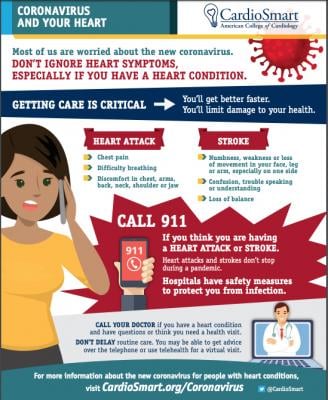
This is an infographic that is part of a new ACC campaign targeting patients amid the COVID-19 pandemic, encourage anyone with heart attack and stroke symptoms to go to the hospital. There has been a major drop in these cases from normal levels since the start of COVID-19.
April 14, 2020 — Since the start of COVID-19 containment efforts across the U.S. in March 2020, there has been a massive drop in the normal number of heart attack and stroke cases showing up at hospitals across the country. This has raised concerns that patients are not seeking medical attention because of fears about going to the hospital.
American College of Cardiology (ACC) is now urging people with what appear to be heart attack and stroke symptoms to seek medical help. The ACC said statistics for emergency rooms (ER) visits show major drops in heart attack, stroke amid the COVID-19 pandemic. The ACC is offering new CardioSmart resources outline to help patients determine when and how to seek help.
Through its CardioSmart patient initiative, the ACC has issued guidance to encourage patients experiencing a heart attack or stroke to call 911. Experts worry that patients who need critical care are delaying their treatment over concerns about the novel coronavirus (COVID-19, SARS-CoV-2).
“Due to fears of contracting COVID-19 or taking up space in hospitals, patients experiencing a heart attack or stroke are delaying their essential care, causing a new public health crisis,” said Martha Gulati, M.D., FACC, editor-in-chief of CardioSmart.org. “Hospitals and catheterization labs are still treating heart attack and stroke, not just COVID-19, and are taking the utmost precautions to ensure that the novel coronavirus not be spread. The faster a patient is treated, the higher the outcome of survival and lower the risk for complications. No patient should delay their care.”
A new CardioSmart infographic, “Coronavirus and Your Heart: Don’t Ignore Heart Symptoms,” encourages patients to pay close attention to heart attack or stroke symptoms, particularly if they have a pre-existing heart condition, and call 911 immediately if they believe they’re having a heart attack or stroke. The infographic details common heart attack and stroke symptoms and ensures hospitals are taking steps to protect them from COVID-19. The infographic also encourages patients to continue routine heart care to ensure they stay healthy, which may be accomplished through telehealth using a remote or virtual visit, or a phone call with their clinician.
“We encourage clinicians to widely distribute these tools to their patients. Make sure that patients know when telehealth is an appropriate option, and when they should call 911 instead,” Gulati said. “Clinicians should work with patients to ensure medication adherence, and always continue to advocate for heart-healthy measures that can be taken even in times of self-isolation and social distancing.”
CardioSmart serves as the ACC’s patient engagement initiative. Reviewed by experts in the CardioSmart COVID-19 Response Work Group, the new infographic joins the full collection of ACC COVID-19 resources, including clinical bulletins, journal articles, patient summaries and more.
For more information about how COVID-19 affects patients with pre-existing heart conditions, and to download the full infographic, visit the https://www.cardiosmart.org/Coronavirus.
The drop in ST-elevation myocardial infarction (STEMI) heart attack cases was noted in an interview with William O’Neill, M.D., director of the structural heart proigram at Henry Ford Hospital in the VIDEO: Impact of COVID-19 on the Cardiovascular Program at Henry Ford Hospital.
Find more information at the ACC COVID-19 Hub
Related COVID-19 Cardiology Content:
VIDEO: Triage Considerations for Structural Heart Patients During COVID-19 From ACC and SCAI — Interview with Etisham Mahmud, M.D.
New York City Physicians Note Multiple Cardiovascular Presentations of COVID-19
VIDEO: Cancelling Non-essential Cardiac Procedures During the COVID-19 Outbreak — Interview with Ehtisham Mahmud, M.D.
ACC COVID-19 recommendations for the cardiovascular care team
VIDEO: What Cardiologists Need to Know about COVID-19 — Interview with Thomas Maddox, M.D.
FDA Approves ECMO to Treat COVID-19 Patients
COVID-19 STEMI Registry Created to Study Acute Cardiovascular Effects of the Virus
Image Gallery Showing Impact of the COVID-19 Pandemic
VIDEO: Best Practices for Nuclear Cardiology During the COVID-19 Pandemic


 July 31, 2024
July 31, 2024 









